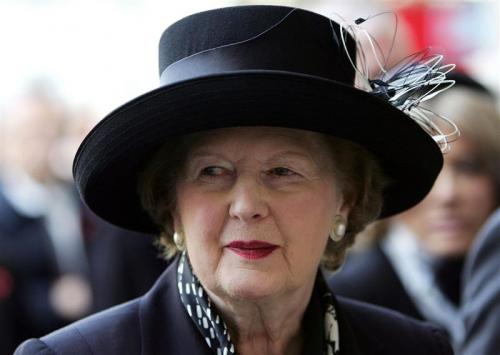Phuket Gazette World News: “Iron Lady’ Thatcher mourned, but critics speak out

– World news selected by Gazette editors for Phuket’s international community
PHUKET: Britain and admirers worldwide are mourning Margaret Thatcher, who has died aged 87, as the “Iron Lady” who rolled back the state and faced down her enemies during 11 years as Britain’s first woman prime minister.
Her impact on the 1980s was such that opponents, including Labour’s Tony Blair and Soviet leader Mikhail Gorbachev, led tributes to a legacy that radically transformed the British economy along free-market lines now widely taken for granted and includes her role in the peaceful end to the Cold War.
But while U.S. President Barack Obama spoke for many in the wider world in praising the grocer’s daughter with the eyes as steely as her resolve, the scars of bitter struggles left Britain itself as deeply divided now as under her leadership.
Tuesday’s newspapers told the story: “The Woman Who Saved Britain”, declared the Daily Mail from the right; “The Woman Who Divided A Nation”, headlined the left’s Daily Mirror, which questioned the grand, ceremonial funeral planned for next week.
Still Britain’s only woman prime minister, the unyielding, outspoken Thatcher led her Conservative party to three election victories, governing from 1979 to 1990, the longest continuous term in office for a British premier in over 150 years.
She was loved and loathed in equal measure as she crushed trade unions, privatized swathes of British industry, clashed with European allies and fought a distant and improbable war to recover the Falkland Islands from Argentina.
She struck up a close relationship with U.S. President Ronald Reagan on the Cold War, backed the first President George Bush during the 1991 Gulf War, and was among the first to discover that Gorbachev was a man she could “do business with”.
“Very few leaders get to change not only the political landscape of their country but of the world. Margaret was such a leader. Her global impact was vast,” said Tony Blair, whose term as Labour prime minister from 1997-2007 he acknowledged owed a debt to the former leader of his Conservative opponents.
Conservative Prime Minister David Cameron cut short a visit abroad and flags flew at half mast: “We’ve lost a great leader, a great prime minister and a great Briton,” Cameron said.
“The real thing about Margaret Thatcher is that she didn’t just lead our country, she saved our country.”
Obama led an outpouring of tributes from the United States: “America has lost a true friend,” he said.
Mourners laid roses, tulips and lilies on the doorstep of her house in Belgravia, one of London’s most exclusive areas. One note said: “The greatest British leader” while another said to “The Iron Lady”, a soubriquet bestowed by a Soviet army newspaper in the 1970s and which Thatcher loved.
But, in a mark of lingering anger at a woman who explained her belief in private endeavor by declaring “there is no such thing as society”, someone also left a bottle of milk; to many Britons, for scrapping free milk for schoolchildren as education minister in 1971, she remained “Maggie Thatcher, Milk Snatcher”.
The former premier died peacefully on Monday morning at the Ritz Hotel after a stroke. Having retreated into seclusion after being deposed by her party, the death of her businessman husband Denis in 2003 and creeping dementia had kept her out of the public eye for years. She had been in poor health for months.
Lord Bell, a spokesman for the family, likened her to her hero Winston Churchill – a comparison echoed on the recaptured Falkland Islands – while Cameron said she would go down as Britain’s greatest peacetime prime minister.
A ceremonial funeral with military honors at London’s St Paul’s Cathedral next week will be short of a full state funeral, in accordance with her family’s wishes.
Parliament, where she deployed fearsome and forensic debating skills that drew on her training as both a research chemist and a courtroom advocate, will return from recess for a special session in her honor on Wednesday.
Cold warrior
The abiding domestic images of her premiership will remain those of conflict: huge police confrontations with mass ranks of coalminers whose year-long strike failed to save their pits and communities; Thatcher riding a tank in a white headscarf; and flames rising above Trafalgar Square in the riots over the deeply unpopular “poll tax” which contributed to her downfall.
To those who opposed her she was blunt to a degree.
“The lady’s not for turning,” she told Conservatives in 1980 as some urged a “U-turn” on the economy in the facing of rising job losses and crashing poll numbers. She stuck to her plans to pare state spending but could thank extraordinary victory in the Falklands in 1982 for helping her bounce back to re-election.
Argentinians were understandably less moved to praise her as Falklanders who called her “our Winston Churchill”. In South Africa, too, there was a coolness after her death as its new, democratic leaders recalled her prevarication on apartheid.
Among Irish republicans, she was remembered as the leader whose firm line saw 10 men starve themselves to death in British jails – and as one who survived the IRA’s deadliest attack on the heart of the establishment when it bombed her hotel in 1984.
In Europe, many in the east had warm words for her refusal to back down against Moscow and the inspiration of her reforms of a centrally planned economy. Among those were Chancellor Angela Merkel, a fellow chemist from East Germany who rose to become her reunited country’s first woman leader.
In western Europe, where the late French Socialist president Francois Mitterrand once grappled with a conundrum he described as having “the eyes of Caligula but the mouth of Marilyn Monroe”, there was respect for her achievements though never great fondness for her “handbagging” lectures on saving money.
Iron Lady
Brought up in a flat with no hot water above the family grocery in the eastern English town of Grantham, Margaret Hilda Roberts learned thrift and hard work from her Methodist father Alfred before going to Oxford University to study chemistry.
She met her wealthy husband Denis, a divorcee a decade her senior, at a Conservative dinner party. They married in 1951 but the young Thatcher faced snobbery from the party grandees: she was female and far too lowly.
“She was the shopkeeper’s daughter from Grantham who made it to the highest office in the land,” said Cameron.
As Conservatives and Labour traded power and blame for an economic and diplomatic decline in the early 1970s, Thatcher was maneuvering behind the scenes and surprised the party by winning the leadership from former premier Edward Heath in 1975.
She made her mark – after a makeover that changed her hair and her voice – by focusing on fiscal prudence and common sense, potent messages when made against the backdrop of the 1978-79 “winter of discontent” when strikes brought Britain’s economy to a halt and the Labour government seemed in thrall to the unions.
The struggles that followed have left their mark on Britain.
“Margaret Hilda Thatcher is gone but the damage caused by her fatally flawed politics sadly lingers on,” the National Union of Mineworkers, which Thatcher virtually destroyed during a failed year-long strike, said on its website. “Good Riddance.”
“I found her to be confrontational, dogmatic, abrasive; she attacked people in her o
— Phuket Gazette Editors
Latest Thailand News
Follow The Thaiger on Google News:


























